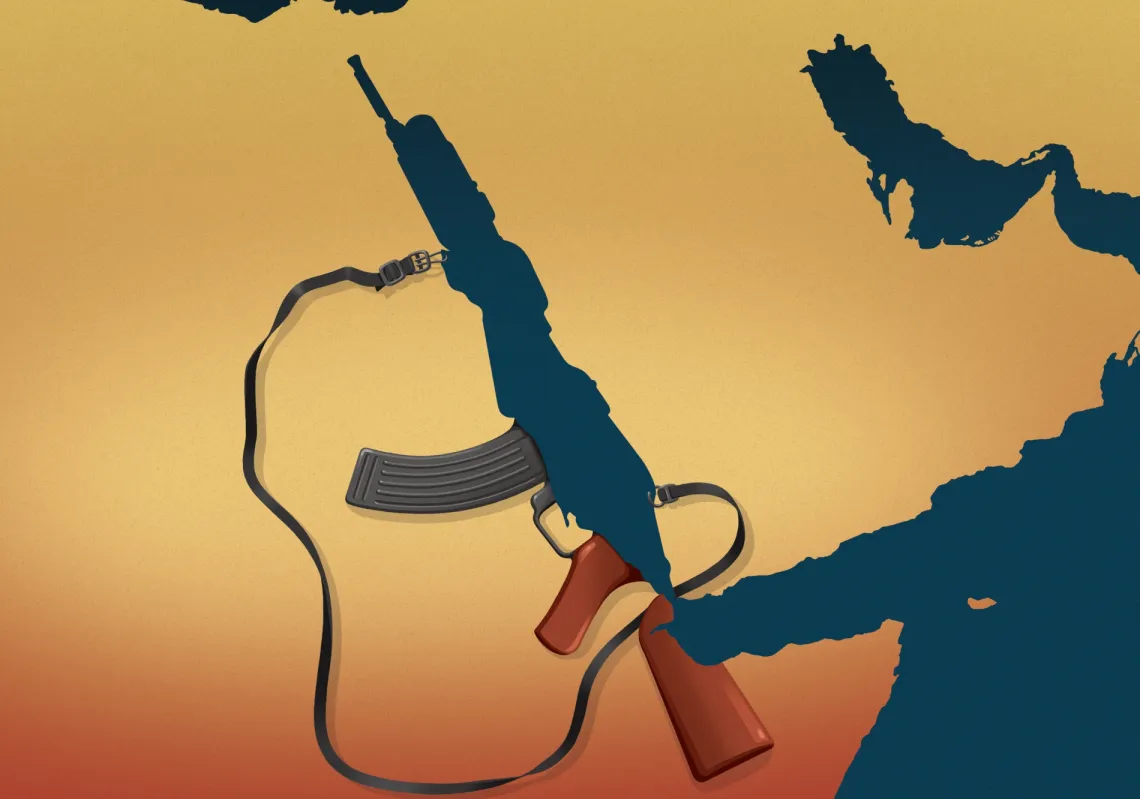The surrender of Abdullah al-Ahmar XII in Granada - the last stronghold of Muslims in Andalusia - and Queen Isabella's acquisition of the city’s key ushered in an era of decadence in human religious discourse, especially as it was accompanied by a decline in the dynamics of the Ottoman conquests in the heart of Europe, and Muslim cannons firing against the walls of Vienna had stopped.
Had it not been for the treachery and the failure of Murad Kerai to protect the Donna River Bridge - to defy the campaign leader Mustafa Pasha, who hated him and plotted against him with Sultan Mehmed IV, the Ottoman Caliph - the Holy League alliance established by Pope Annost XI would have not crossed the bridge and taken the Ottoman army by surprise. Adding to that, the army had been under prolonged siege, the soldiers' consumed wine, looked after spoils, and slept with women, which forced Mustafa Pasha to withdraw. It was the last time the Turks invaded Europe in September of 1683.
Consequently, the decline of the Islamic caliphate began, and the caliphs retreated one after another as a result of palace conspiracies, spread of corruption and bribery, and the increased influence of concubines as well as the emergence of centers of power away from the Sultan's Court, who could only rule his hall. Centers of power independently seized the farther regions, so the Europeans called the Ottoman Empire "the sick man's legacy."
With a contemplative look, we note the simultaneous progress of the Ottoman Caliphate in the Islamic East towards Western Europe, at a time when the Umayyad Caliphate was fading away in the Islamic West. Despite the naval power of the Ottomans at that time, they were not moved by the loss of Andalusia. Also, the Mamluk Sultanate in Egypt and the Levant was suffering from renewed attack by Crusaders, so everyone fell silent. Thus, the Umayyad Caliphate fell in Andalusia after the failure of the kings of the territorial divisions (Taifas’ kings), followed by the decline of the Ottoman tide.
The unbiased observer can conclude that, at that time, the Islamic nation did not exist as a political or social entity, in addition to doubts in the caliphs and princes’ religious conscience. If the nation existed in the correct sense, everyone would have joined to save Andalusia. There was only that attempt by the hero Youssef Ibn Tshifin, the leader of the Almoravids, to cross Gibraltar from his caliphate in Morocco to unite the kings of Taifas and teach the Frankish forces a lesson which they would quickly forgot. The Frankish repeated their aggression, which eventually led Abdullah Al-Ahmar XII to cry to his mother over the demise of his kingdom. History perpetuated her reply, "Do not cry like women over a lost kingdom which you could protect as a true man."
The human religious discourse faded, full of wounds and became a mere memory of some honorable positions from Islamic history. The discourse became a prisoner of time, and the curve of its descent went further down until we reached the awakening of boys in the twentieth century and their leap over events and history. They invoked the jurisprudence of the tortured jurist Taqi al-Din Ahmed Ibn Taymiyyah, without noting that his fatwa was issued under the drumbeat of the Mongol invasion of Asia, the burning of Baghdad, and the threat of conquering Egypt. The man’s discretion was based on his perception of places of war and peace.
Nevertheless, Shukri Mustafa, and his Takfir and Hijra group came out with a philosophy that called for a separation from the “pagan” society via migration to the outskirts of cities and villages on the edge of the desert. They claimed they would establish a pure society which was focused on growing beards, wearing specific clothes, using miswaks (teeth cleaning twig) and quitting public jobs, just to trade in combs, miswaks, and some vegetables. They were disabled capabilities. But they exposed the backwardness of Al-Azhar and its weak religious discourse. During his trial, Shukri presented fiqh matters in the military court, which were responded to by officers due to the absence of the role of Al-Azhar. Eventually, Shukri and some of his followers were hanged, not for their separation from society, but for killing Sheikh Al-Dhahabi after he was kidnapped at night from his home.
However, that did not deter the extremist thought that was started by Saleh Sariyah, who believed in the radical ideology of Hizb ut-Tahrir, which was founded in 1950 by Taqi al-Din al-Binhawi, born in the Palestinian village of Ijzim. It is the same birth place of Saleh Sariyah, who landed in Egypt and tried to contact the guide Al-Hudaybi, although Sariyah disbelieved in the feasibility of awareness and Islamic education. Sariyah believed in armed coup as the shortest path to rule, after which the masses could be educated, but he ended up on the gallows after killing the guards of the Military Technical College in 1974, in a failed military coup due to his lack of intellectual capability.
Given that their goal was to rule, it was an objective shared by the assassin of (the Egyptian President) Sadat, Abd al-Salam Faraj, who had an outstanding ability to theorize, so he dived into the depths of the Islamic heritage and came out with the booklet of "The Neglected Obligation", which was a passport for Sadat's assassins.
It was a booklet based on political and religious projection using the Mardin fatwa issued by Ibn Taymiyyah during the Mongol aggression. The summary of this fatwa is that it permitted killing some Muslims if the ruler was entrenched behind them. Unfortunately, many fell into this trap, and Al-Azhar did not try, via its religious discourse, to refute this fatwa, which became the charter for all extremist sects.
Mardin was a city located on the Silk Road between China and the Levant and was threatened with ruin and destruction like Baghdad by the Mongol aggression, so its ruler, Badr al-Din Ghazi, tried to approach Hulagu and make peace with him. Hulagu agreed to receive Ghazi’s son Muzaffar as a hostage to live under Hulagu's custody. Hulagu did not find any difficulty in recruiting the shameless son, so he sent him to kill his father and ascend to power as an agent of Hulagu, to rule Muslims by the law of Hulagu, which is a mixture of Islam, Christianity, Judaism, and Mongolian paganism.
However, Mardin was not, of course, a place of war, nor was it a place of peace, so Ibn Taymiyyah permitted the killing of its ruler, even if it led to the downfall of some Muslims who worked with him and protected him, whether they were the army, the police, or his courtiers. Until now, no one realized that this fatwa could be valid as a reaction to Muzaffar’s killing of his father or selling his homeland.
Due to weak religious discourse, extremist groups imported the ideas of Ibn Taymiyyah, who spent most of his life in the Sultan's prison, angry with most of the majority scholars, and in a fierce war with the Sufis and the Alawites.
Even when the Muslim Brotherhood tried to delve into religious discourse, they found nothing but Sayyid Qutb's ideas of governance, divinity, and godliness, so that his book "Milestones on the Road" was the pillar of jihad’s jurisprudence that directed the battle against the hearts of Muslims.
As for the external enemy, it was a delayed issue. Poverty along with the communication revolution joined forces with large numbers of pseudo-intellectuals being admitted to universities which became fertile breeding grounds for extremists after the Brotherhood adopted political piety and issued conflicting messages without real ideology.
Muslim Brotherhood has depended on the religious discourse of Al-Azhar, and no one was merciful to the Muslim youth to answer their questions about identity and how to be a Muslim in a world that has become a small village and instead we got strange fatwas of breast-feeding the elder or the sex of angels, etc.
We live in an open society, so I firmly believe that human religious discourse should focus on noble morals. The incident of Omar Ibn Al-Khattab and Abu Dhar Al-Ghafari, may God be pleased with them both, form the code of ethics that must be followed. The incident was that a man killed another man, and the verdict of death penalty was issued, but the murderer asked Omar to set him free for some days to return some of the trusts he had and say goodbye to his mother. Omar asked who would be guarantor for the man, but everyone remained silent except for Abu Dhar. Omar warned Abu Dhar that he would be killed if the man escaped. The killer disappeared and did not turn up until the last hour, when most Muslims thought he had escaped. Everyone attended in preparation for the execution of the sentence, and then Omar asked Abu Dhar what made him guarantee a man who no one knew. Abu Dhar replied, "O Commander of the Faithful, I was afraid that it would be said that chivalry has been lost among Muslims.” The Omar asked the killer what made you come even though you could have escaped with his life? He replied, "O Commander of the Faithful, I was afraid that it would be said that loyalty was lost among Muslims.” Finally, when the killer's son heard them, he said, "O Commander of the Faithful, I have pardoned the killer so that it would not be said that tolerance between Muslims is gone.”
This is the inspired religious discourse.
* Gamal Abdul Mabud is an Egyptian writer and researcher in the history of religions and philosophy of doctrines.









